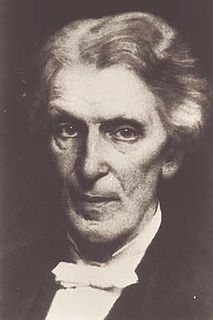A Quote by William A. Dembski
Naturalism is the view that the physical world is a self-contained system that works by blind, unbroken natural laws. Naturalism doesn't come right out and say there's nothing beyond nature. Rather, it says that nothing beyond nature could have any conceivable relevance to what happens in nature. Naturalism's answer to theism is not atheism but benign neglect. People are welcome to believe in God, though not a God who makes a difference in the natural order.
Quote Topics
Answer
Any
Atheism
Believe
Believe In God
Benign
Beyond
Blind
Come
Contained
Could
Difference
God
Happens
Laws
Makes
Natural
Natural Law
Natural Laws
Natural Order
Naturalism
Nature
Neglect
Nothing
Order
Out
People
Physical
Physical World
Rather
Relevance
Right
Say
Says
Self
Self-Contained
System
Theism
Though
Unbroken
View
Welcome
Works
World
Related Quotes
It would be impossible to accept naturalism itself if we really and consistently believed naturalism. For naturalism is a system of thought. But for naturalism all thoughts are mere events with irrational causes. It is, to me at any rate, impossible to regard the thoughts which make up naturalism in that way and, at the same time, regard them as a real insight into external reality...If it is true, then we can know no truths. It cuts its own throat.
In my understanding of God I start with certain firm beliefs. One is that the laws of nature are not broken. We do not, of course, know all these laws yet, but I believe that such laws exist. I do not, therefore, believe in the literal truth of some miracles which are featured in the Christian Scriptures, such as the Virgin Birth or water into wine. ... God works, I believe, within natural laws, and, according to natural laws, these things happen.
Science...has become identified with a philosophy known as materialism or scientific naturalism. This philosophy insists that nature is all there is, or at least the only thing about which we can have any knowledge. It follows that nature had to do its own creating, and that the means of creation must have included any role for God.
The world of strict naturalism in which clever mathematical laws all by themselves bring the universe and life into existence, is pure [science] fiction. Theories and laws do not bring matter/energy into existence. The view that they nevertheless somehow have the capacity seems a rather desperate refuge...from the alternative possibility...Trying to avoid the clear evidence for the existence of a divine intelligence behind nature, atheist scientists are forced to ascribe creative powers to less and less credible candidates like mass/energy and the laws of nature.
For the religious, passivism [i.e., objects are obedient to the laws of nature] provides a clear role of God as the author of the laws of nature. If the laws of nature are God's commands for an essentially passive world ..., God also has the power to suspend the laws of nature, and so perform miracles.
I'm not attracted to naturalism, I'm not attracted to behavior, I'm attracted to dance. I'm attracted to gesture, I'm attracted to singing with your voice, as opposed to having a natural manner. I'm a theater actor first, so that probably influences a lot of my approach. And I think in many ways, naturalism has ruined movies.
Nothing is a surprise to God; nothing is a setback to His plans; nothing can thwart His purposes; and nothing is beyond His control. His sovereignty is absolute. Everything that happens is uniquely ordained by God. Sovereignty is a weighty thing to ascribe to the nature and character of God. Yet if He were not sovereign, He would not be God. The Bible is clear that God is in control of everything that happens.
"Methodological naturalism" and "metaphysical naturalism" are terms that often surface in the continuing battle between evolutionary biology and creationism/intelligent design. The methodological thesis says that scientific theories shouldn't postulate supernatural entities; the metaphysical thesis says that no such entities exist. In this debate, God is the supernatural entity at issue; the question isn't whether science gets to talk about mathematical entities if Platonism is correct.
Regularity in Nature is not proof of the control of Nature by a Divine intelligence; it is rather the reverse. If something- call it matter, or ether, or x - exists, it must operate in accordance with its innate qualities; and so long as this x remains uncontrolled, its manifestations will continue unchallenged- in other words, there will be order. The same causes, the same results. That is the manifest signs of a natural order that knows nothing of God.








































